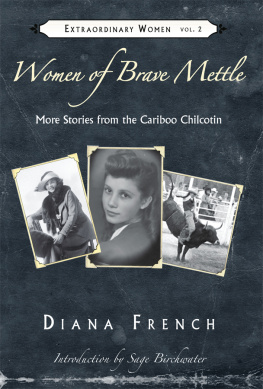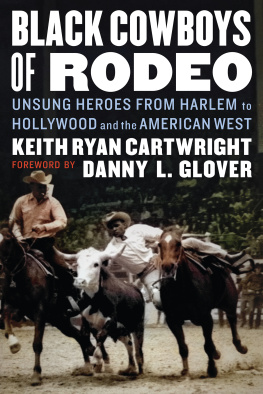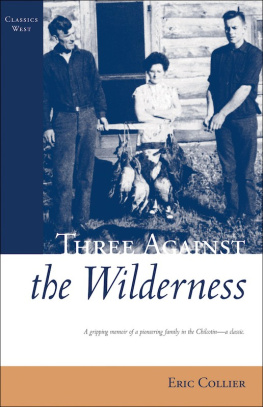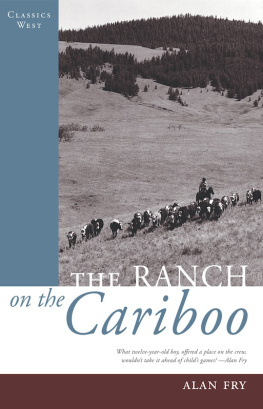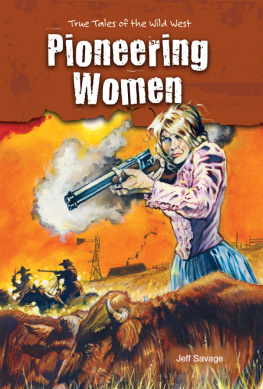
A text at the top of the cover reads: Extraordinary Women Volume 2.
Women of Brave Mettle
More Stories from the Cariboo Chilcotin
Diana French
Extraordinary Women vol. 2
Copyright 2012 Diana French
All rights reserved. No part of this publication may be reproduced, stored in a retrieval system or transmitted, in any form or by any means, without prior permission of the publisher or, in the case of photocopying or other reprographic copying, a licence from Access Copyright, the Canadian Copyright Licensing Agency, .
Caitlin Press Inc.
8100 Alderwood Road,
Halfmoon Bay, BC V0N 1Y1
caitlin-press.com
Edited by Rebecca Hendry.
Typeset by Vici Johnstone.
Cover design by Vici Johnstone.
EPUB by Kathleen Fraser.
Caitlin Press Inc. acknowledges financial support from the Government of Canada through the Canada Book Fund and the Canada Council for the Arts, and from the Province of British Columbia through the British Columbia Arts Council and the Book Publishers Tax Credit.
Library and Archives Canada Cataloguing in Publication
French, Diana
Women of brave mettle : more stories from the
Cariboo Chilcotin / Diana French.
(Extraordinary women ; 2)
ISBN 978-1-927575-83-3
1. WomenBritish ColumbiaCariboo RegionBiography.
2. WomenBritish ColumbiaChilcotin River RegionBiography.
3. Cariboo Region (B.C.)Biography. 4. Chilcotin River Region
(B.C.)Biography. I. Title. II. Series: Extraordinary women
(Halfmoon Bay, B.C.) ; 2
FC3845.C3Z48 2012 971.175030922 C2012-903337-5
Contents
Foreword
It is quite fitting that Diana French took up the torch to write Women of Brave Mettle, the second volume of Caitlin Presss Extraordinary Women of theCariboo Chilcotin series. Shes been there, done that.
Diana has lived with water buckets and wood stoves, sat on various boards of directors and spent years working at the Williams Lake Tribune. Her personal involvement with a wide variety of community groups and individuals in more than six decades in the region has put her in contact with women from all walks of life.
The exploits of men in the Cariboo Chilcotin have been well documented. The accomplishments of women, not so much. Thats what spurred the Womens Contact Society of Williams Lake to initiate a project in 2004 to collect womens stories. Women were invited to write about their own lives or to allow others to write about them. Then for three or four years this collection of two dozen stories sat in a box.
In late 2008 I got seconded into editing this material for publication. In spring of 2009, Caitlin Press publisher Vici Johnstone got wind of our project and expressed an interest in publishing it. She encouraged us to expand the number of stories, and the resulting anthology included the work of twenty-three writers and the stories of thirty-eight women. In the fall of 2009 Caitlin released Gumption & Grit: Women of the Cariboo Chilcotin, Extraordinary Women Volume One and it was a bestseller in the region.
It was obvious from the onset that Gumption & Grit only scratched the surface. There were many more women whose stories deserved to be told.
As well as her newspaper background, Diana French is the author of two books, The Road Runs West (Harbour Publishing, 1994) and Ranchland with Rick Blacklaws (Harbour Publishing, 2001). She wrote the foreword to Gumption & Grit, and is one of the women featured in the anthology, so it was a natural fit for her to continue the Extraordinary Women series.
Diana arrived from Quadra Island to teach school at Chezacut in a remote corner of the Chilcotin in 1951. Within a year she married local ranch hand and equipment operator Bob French and never left. When Bob got a job driving grader for the Public Works Department in 1957, the young family, which now included two sons, moved to Alexis Creek. Diana spent the next five summers travelling with Bob as he graded the 200-kilometre stretch of Highway 20 between Alexis Creek and Anahim Lake. At first they stayed in the emergency log cabins located strategically along the highway, then Diana kept house in a portable travel trailer with their cat and dog and growing family of boys. They moved camp every three or four days as Bob worked his way along the road.
By the time they moved to Anahim Lake where Bob was posted in 1962, they had four sons and a fifth on the way. They left for Bridge Lake in 1965, then on to Williams Lake in 1970 where Diana has lived ever since.
She says a big motivation behind writing Women of Brave Mettle was to acknowledge the lives of women who very quietly went about making a contribution to the community. A lot of people werent aware of what they did, she says. Women havent had the same spotlight the men have had. Yet in the rough and tumble macho image of the Cariboo Chilcotin, isnt it interesting that Williams Lake has the oldest art society in British Columbia?
Diana tells the stories of these fifty women as only she can. Candidly, with depth and feeling. Women of distinction, women who made their mark, mothers and daughters, the wives of politicians, the ladies of the Tribune, and women gone but not forgotten
She could easily do the stories of a hundred more women, Diana admits. She laments that the allotted space hardly does justice to the lives she portrays. Its just a snapshot, she says. Most deserve a whole book written about them.
Sage Birchwater
Part 1: Gone but Not Forgotten
Mickey Dorsey
Her Enthusiasm for Life Was Catching

Today most of the Chilcotin country is served by decent roads, hydro power, television and the Internet. It wasnt always so. The west Chilcotin particularly was a holdout when it came to the trappings of modern civilization. It was a mans country, the last frontier, but some remarkable women lived there.
One of them was Mickey Dorsey. She is best known as a schoolteacher, one of the special kind who can really make people learn. She had boundless enthusiasm for learning and for life in general, and it was catching. Everyone was better for having known her.
She was born Hannah Clarissa Tuck in 1911 in Sidney, Nova Scotia. Her father was a sea captain and a ship builder, and in 1914 the family came to Vancouver where he managed Western Canada Shipyards. He retired in 1922, when Mickey was eleven, and moved to Bella Coola valley where, among other things, he designed and built boats for local fishermen.
As a child, Mickey watched the pack trains with their strings of horses come and go from the Chilcotin plateau. She listened to tales of the Great Beyond up the mountain, and she dreamed of seeing it for herself. She went to a one-room school in the valley until Grade 8, then to Ocean Falls for high school. When she was home for holidays she made a few trips by horseback with friends to the Rainbow Mountains and the Anahim Lake area. She loved the high country and the adventures encountered getting there by horseback.

